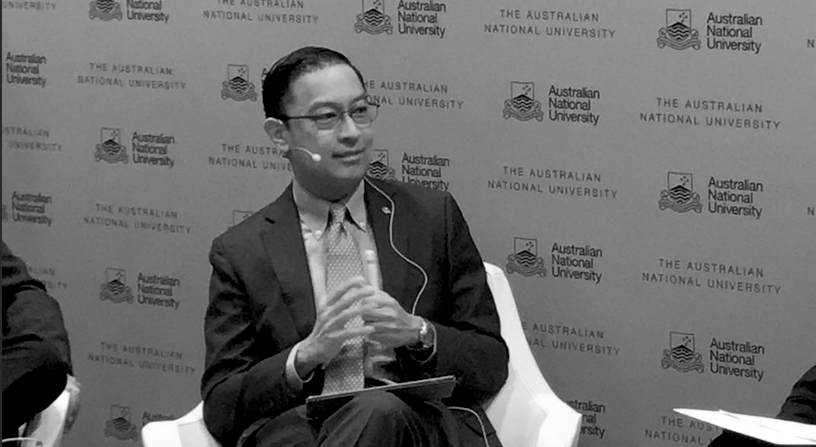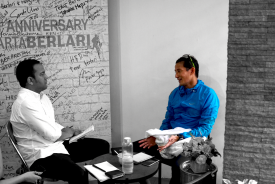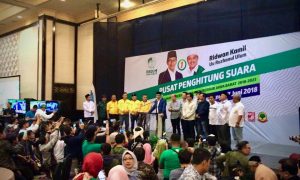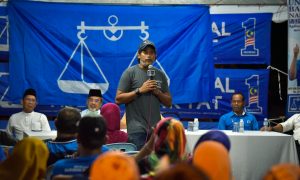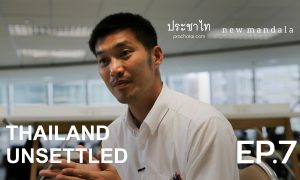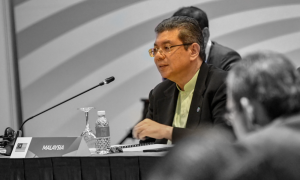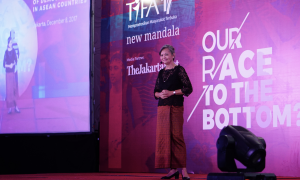Editor’s note: Thomas Trikasih “Tom” Lembong, the chairman of Indonesia’s Investment Coordination Board, recently visited Canberra for the 2019 ANU Crawford Leadership Forum. On the sidelines of the Forum, Mr Lembong kindly made time for an interview with ANU’s Prof Hal Hill for New Mandala. A recording of the interview, available below, was made by Serena Ford, and the transcript was prepared by Catherine Yen.
[HAL HILL] It’s my great pleasure to be interviewing a most distinguished Indonesian citizen, the honourable Thomas Lembong—Pak Tom, if I may. He’s had a very distinguished career in many fields, including in finance and business. And for the past five years, he’s been a member of President Jokowi’s cabinet, initially as trade minister and then as head of the Indonesian Coordinating Investment Board [Badan Koordinasi Penamanan Modal], which is a very important part of Indonesian economic policy-making and setting the business environment more generally. So Pak Tom, welcome.
[THOMAS LEMBONG] Thanks for having me.[HH] Thank you for coming in in Winter when it’s rather chilly and thank you for the opportunity to talk. Pak Tom, may I start with a general question about the Indonesian economy? So Indonesia’s economic performance has been very stable since the terrible period of the Asian Financial Crisis, the krismon. It’s averaged growth of 5–6% every year since the year 2000. This is very impressive. It’s managed the global financial crisis very effectively and managed a very difficult global economic environment. I guess the question to begin with is: is 5% growth enough? Is it enough given that President Jokowi had a target of 7% at the beginning; presumably he’ll say something like that for his second term. And some of the other economies in the region—India, China, Vietnam, Philippines—are actually growing a bit faster. So Indonesia’s growth is very stable but is it fast enough? If it’s not fast enough, how should the growth be accelerated?
[TL] Sure, it’s true that we’re growing at around 5% and what President Jokowi has successfully done in his first term is to arrest the decline, if you will. Because when he took office at the end of 2014, we were heading into our fourth consecutive year of decelerating, slowing economic growth. And essentially by implementing an economic reform agenda, starting with politically very difficult fuel subsidy reforms, he was able to turn that around essentially. So our GDP growth has bottomed at around 4.5% in the second year of President Jokowi’s term and has been in an upward trend ever since, hitting a high of about 5.17%.Is it fast enough? Clearly no. Where did President Jokowi get 7%? Frankly, the World Bank and IMF estimate that to fully absorb all the new entrants into the labour force every year, we would need about 7%, which is probably true for India, Philippines, Vietnam and most emerging countries, emerging economies with our kind of demographics.
How do we get there? There’s really only one way and that is structural reform, right? And that’s what we’ve been working to do. Admittedly, progress has been uneven. I describe it as three steps forward, two steps backward. But we’re generally headed in the right direction and maybe frankly we lucked out a bit because other countries seem to be shooting themselves in the foot one way or another, whereas so far we’ve just been steady and consistent, maybe with a few ups and downs but generally quite stable.But to give you an example, the easiest way by far—actually I’d argue the most painless reform—is simply to open up more sectors of the economy to international investment and international involvement. And we’ve seen in sector after sector how immediately capital floods in. Growth in a sector goes into the double digits and beyond. Jobs are created, often high-quality jobs. And, ironically, the entrenched incumbents—the local incumbents who are most resistant to the market opening—usually end up being the biggest beneficiaries and the earliest beneficiaries, because suddenly all these international investors show up at their doorstep wanting to invest in their companies and make them rich and liquid. So I think we can certainly expect more of that kind of market opening in President Jokowi’s second term.
And I was going to add, in a way, President Jokowi came into office at quite a difficult time because it was just about at the end of the commodity boom.
Correct.
As in Australia, by the way. And in both countries, the expectations that the community developed during the commodity boom for government to be able to spend money endlessly has suddenly came to an end in both countries. And that was I think President Jokowi’s decision to very substantially reduce the petroleum subsidies in late 2014. It was surely one of the most important achievements in the early days of his office. Can I follow up on your question of opening up the economy? Which particular sectors, so you’ve had 16 packages—
Policy reform packages.
—which have gone some of the way but I guess there’s still, it could be said, a substantial agenda. Could you tell us a little bit of where some of the agenda might go—some of the quick wins, because there are always politically difficult. By definition, reform has winners and losers but there’s a net gain if it’s done well.
What we have already announced and will be putting into implementation soon is in the trade agreement which we signed a couple of months ago between Indonesia and Australia, the CEPA, the Comprehensive Partnership Agreement. And that is, we’re going to open the university sector and the vocational training sector from currently 0% foreign ownership allowed overnight to 100% foreign ownership allowed. And you know, this is very similar to three years ago when we opened movie production and movie exhibition and movie distribution from 0% foreign ownership allowed to 100% foreign ownership allowed. Foreign capital, international capital flooded in.
That had a big impact, didn’t it?
Very, very big. Because it’s movie production, movie distribution. Movie theatres are [in the] service sector, where all the services are done by people—from movie production, costume design, costume creation, set carpenters, catering, lighting, transportation. It’s all jobs—and high-quality, high-paying jobs.
So since we opened up the movie sector, it’s been growing 20–25% per year, meaning it’s doubling every three and a half years, and creating a lot of high-quality, high-paying jobs in the process. So we expect the same with the university and higher-education sector. So that’s just one.
The second thing that President Jokowi has already commented on publicly in the Indonesian local media is [that] in his next cabinet he wants what he calls implementers and executors. So I think we would have to admit that the 16 policy packages that we have announced are all conceptually good but perhaps implementation in the field has been lacking, right?
The President anyway is always focused on implementation and execution. I think after four and a half years in power, he not can really judge who is likely to be an effective implementer and executor, versus not. So it’s not only about the right policies and the right policy direction, it’s really implementation and execution in the field.
Actually, Pak Tom, I’m tempted to ask you for a new scoop: who’s going to be in the new cabinet? I’ll leave that to my Bloomberg colleague to ask you that obvious question. You mentioned people being important in services and that’s what we know about services by their nature. So let me ask another question, if I may, that is related. I’ve been visiting Indonesia for about 45 years pretty regularly and I’ve always come away with the impression that Indonesia is a pretty friendly country. I’ve had a wonderful time visiting and living in Indonesia. But if you look formerly at the visa and migration procedures and look at these various international rankings, Indonesia doesn’t come across as a particular open international labour market, particularly compared to Singapore, Malaysia, Thailand and others. So I’ve always thought that there’s something of a disconnect between the friendliness of the people and the formal, rather restrictive regulations. So as part of the services opening up, do you see any changes in the labor regulations, in particular international migration regulations.
Well, I’ll give two answers to that. The first answer is: yes I do. I do expect us to internationalise more and be more open and welcoming to people from the outside world. Frankly, you’re absolutely right. At straight level, our people are welcoming, warm and curious about foreigners, love to chit-chat with foreigners and find out about them. Very, very friendly.
The first question you’re asked is “dari mana?”
But of those the ones who control our immigration policy are elites. And it’s really us elites who try to make the economy restrictive and closed, because that puts us in a privileged position. So it’s the business elites, in conjunction with the political elites, who are constantly promoting protectionist policies to shield ourselves from international competition, which would actually create jobs and also lower prices and improve quality for consumers. But look, that’s totally breaking down.
The second answer from me is really the internet. And President Jokowi has mentioned on many occasions the internet is truly borderless and it means the death of distance. One way or another our people will meet, and will intermingle and socialise, whether it’s in person or via Facebook and Instagram and YouTube and other internet media. And over time, I think, it’s absolutely going to be a much more open and welcoming economy and society.
A related question is looking back at your period in cabinet, the five years in the Investment Board and Trade Ministry, I guess it would not be unreasonable to describe you as a liberal reformer, along with my good friend Ibu Sri Mulyani and others. So we know reform is always difficult. If it’s done well, there’s always going to be a net gain for society and the economy. But there’s going to be micro-winners and micro-losers, and what’s always struck me about Indonesia is that when it has reformed it’s been successful. The best example is probably the mid-1980s when Ali Wardhana did dramatic reform and Indonesia came through that difficult period very successfully. Looking back over your five years in cabinet, what are some of the general lessons you’d draw out? So the old model under Suharto was top down. You went to the bapak, persuaded him as Ali Wardhana did, and you got the reform. Now of course Indonesia is one of the most democratic, fluid, pluralistic societies, so what are your reflections on how to do successful reform, winning over constituencies, getting people on side.
Well, we’re what one might call the reformist faction in the cabinet, which I’m obviously a poster boy and a favourite whipping boy of. We’re very fortunate because President Jokowi is a sincere and ardent reformer, right? So even though the reformist faction is a minority in the cabinet, we have the president on our side. And he understands on a very deep level the power of reform. What I always argue is that in actuality, the payback to reform is very fast. My estimate is about 3 years. So that actually fits inside one electoral cycle, and in Indonesia we have a five-year presidential term.
So in Indonesia you can actually harvest the fruits and success of the reform before your next election, provided you start right away. If you delay by 12 or 18 months, you’re screwed, because you inflict all the controversy and pain but you don’t get to harvest the fruits of that reform before the next election. So the key really for any government in the world is to start early in your term so you can show the results before you have to run for re-election. Now in this case, President Jokowi is headed into his second and final five-year term so he no longer has to worry about—
This is the last chance.
—yes. But I believe that he is keenly aware that whatever he does in this next five-year term will set the tone and lay the foundations for the next 15–20 years. As you can imagine, he is in periodic and regular dialogue with the next generation of leaders, the up-and-coming younger generation of governors, mayors, political leaders who are leading candidates to run for president and vice-president in 2024. And I think my observation is that the outlook for that is very, very bright, because I detect almost no policy disagreement from this next generation of leaders. People like, you know, West Java Governor Ridwan Kamil or East Java Governor Khofifah or Jakarta Governor Anies or South Sulawesi Governor Nurdin Abdullah.
I’ve never heard any disagreement with the President’s reformist policy agenda. If anything, they might try to deepen and accelerate this reform agenda should they come into power post-2024. But you’re right, it no longer is a dictatorship system. It’s no longer a sort of top-down hammer. So you do have to you know, bring people along. You do have to create a narrative around it and share success stories. And the funny thing is, in my experience, the entrenched local incumbents who are most resistant to reforms are often the biggest and earliest beneficiaries of the reform. So one year, two years later, they’ve become rich. And they drop all their opposition to those reforms. So this notion that reform is painful and has a long payback is not has proven to be the case in my experience over the last 5 years.
I think they’re very important and pertinent observations. I’ve always thought the best, the most insightful academic article on reform under President Suharto was by my good late friend Hadi Soesastro, head of CSIS. He wrote a very insightful piece on how reform operated under President Suharto. And we haven’t really seen a good, detached academic piece in the democratic era. So maybe sometime I’d like to ask you to write that paper, when you’ve retired! So final question is situating Indonesia in the broader regional and global context. So these are very difficult times: the global financial crisis 10 years ago, we’ve still got very serious problems with monetary policy, zero interest rates. Now we’ve got trade wars on the horizon looking like they may eventuate. Indonesia in some ways, like Australia—the two dominant economic and strategic powers are the US and China and as much as possible, we want to sit on the sidelines because we don’t want to get involved in the battle of the giants but we may have to. And I wonder what your thoughts are. First of all, we have to get our own houses in order. You know, fiscal prudence and so we don’t have too debt to worry about if interest rates go up. But there’s a broader issue of the weakening of the regional and global architecture: the WTO under threat, all the other problems. I wonder what your thoughts are on how we navigate these perilous waters.
I believe that Indonesia has a bit of a luxury to be in the middle. It really hit me very strikingly 4.5 years ago when I went to Nairobi for a WTO summit as trade minister for the first time. And you know, Indonesia is so smack in the middle. We’re a large country: the fourth most populous country in the world, 16th largest economy in the world now.
And going to become the 5th largest on most projections.
So the large economies, the big countries respect us and care about what we have to say. But we’re not giant. We’re not these superpower giants that smaller countries might find intimidating. So we’re still small enough that smaller countries feel very comfortable talking to us. We’re a G20 economy. As I mentioned at market exchange rates, number 16; at PPP, maybe higher already.
Number 9 at PPP.
Right. So we’re a sizeable economy but we’re still a developing economy as well. We’re still a third-world country. As a G20 economy, as a trillion-dollar per year GDP, the big economies again want to hear what we have to say but the emerging markets, the developing countries feel a kindred spirit as well.
So I was struck by how perfectly in the middle we are. Certainly for Indonesia, I think we can be a bridge. We can be the common ground. Now, President Jokowi is a lifelong businessman. He will tend to approach most challenges, most issues with a strongly entrepreneurial spirit. He will try to identify what are the opportunities, what is the opportunity in adversity. We have faced so many global challenges from climate change to at this ANU Crawford lecture series, microbial, antibiotic resistance was brought up. We have ocean debris, plastic pollution, air pollution. But each of these global challenges represents multi-billion-dollar business opportunities. So if I had to guess, I would predict that President Jokowi will be constantly pushing for these business opportunities, to collaborate, to find common ground, to tackle jointly the global challenges that we face.
And on that hopeful note, let me thank you very much for being available for the interview.
Thank you for having me.
 Facebook
Facebook  Twitter
Twitter  Soundcloud
Soundcloud  Youtube
Youtube  Rss
Rss 